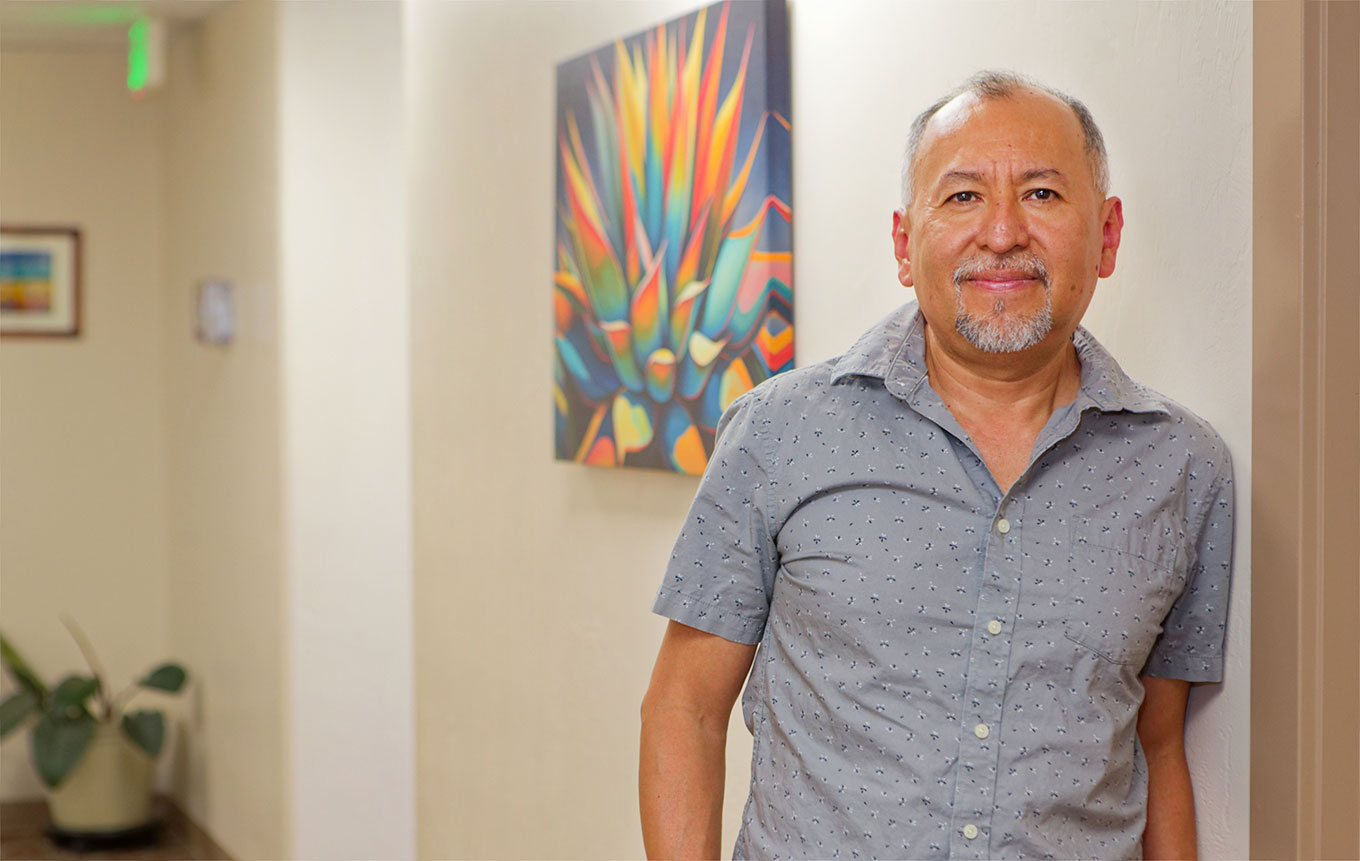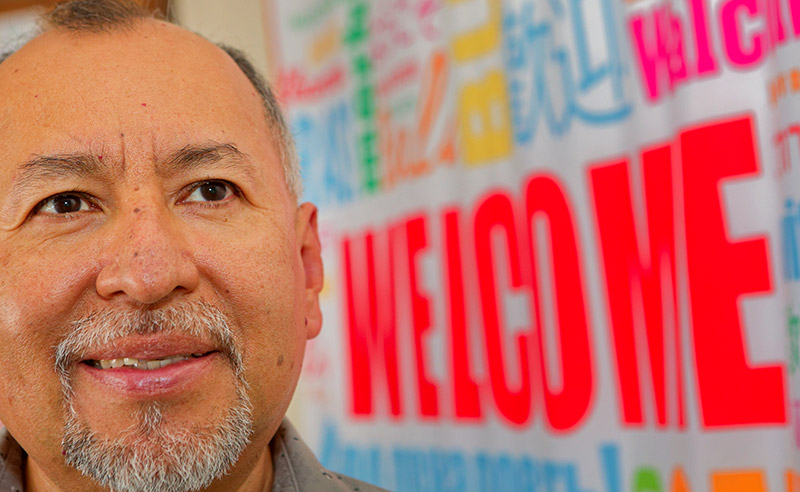40th Anniversary: A Montrose-based Nonprofit Continues to Push for Immigrant Integration and Acceptance
Leer en español
Ricardo Perez, executive director of the Hispanic Affairs Project, poses for a photo at the organization’s offices in Montrose, Colo., on Wednesday, July 9, 2025. Photo by Barton Glasser / Special to The Colorado Trust
By Nancy Lofholm
On a Saturday in May 2006, Ricardo Perez swelled with pride as he stood amid more than 4,000 immigrants and their supporters at a Grand Junction park.
They had come together at the urging of what was then a new Montrose-based organization called the Hispanic Affairs Project (HAP). Perez is its executive director, and this was the first large-scale event HAP had organized since forming a year earlier. It was held in conjunction with millions marching across the country to protest new immigration restrictions.
Perez was stunned at the turnout, he said, and awed by the energy emanating from the crowd. Participants had shown up waving Mexican flags, carrying United Farmworkers of America banners and iconic Our Lady of Guadalupe posters. As they marched down a Grand Junction thoroughfare, some clutched photos of ancestors who had come to the U.S. before them.
“It was a turning point. We saw the power that day,” recalled Perez, who immigrated to the U.S. from his native El Salvador in 2004.
Perez and 35 leaders from 13 communities founded the Hispanic Affairs Project in 2005. HAP was designed as a clearinghouse organization where immigrants could receive various forms of assistance and develop skills to become community leaders.
That era was a prime time for immigrant activism because millions of immigrants had come to the U.S. following the passage of the 1994 North American Free Trade Agreement. Extreme poverty in Mexico doubled the number of Mexican migrants to the U.S. in the 1990s. Annual migration from Mexico climbed to more than 12 million at its peak, two years after the Grand Junction march. This influx sparked a border crackdown and stricter immigration enforcement.
The 2006 march “was a very important moment because we were connecting with others,” said Perez, who had begun human rights activism with the Catholic Church in El Salvador. “It was the first time I realized how much these immigrants needed to engage with others.”
The Latino/a/x immigrant population is now in a new period of crisis with the Trump administration’s harsh measures to arrest and deport undocumented immigrants. Since January, there have been numerous public and workplace raids across the country. Immigrants with no criminal histories have been incarcerated; some even have documentation.
Most Immigration and Customs Enforcement (ICE) agents wear masks and do not show identification, and they are making arrests at once-neutral locations like courthouses. There have been recent reports of ICE agents detaining immigrants on highways and outside Wal-Mart stores in western Colorado, putting immigrant populations more on edge.
HAP recognizes that those fears make it more difficult for immigrants to be involved in their communities through engagement in civil and social organizations—something HAP has long pushed. Perez said he believes integrating immigrants into communities is even more critical now: If local citizens better understand immigrants’ life stories and why they came to the U.S., he thinks they will treat immigrants with more respect and dignity.
Perez said more community involvement is now a difficult ask of immigrants when anxiety is heightened. Some immigrants, including the farm workers who have been coming to the Western Slope for decades to plant, tend and harvest crops, fear even going to the grocery store, much less participating in public displays like marches and rallies.
“These people are afraid. They want to be invisible,” Perez said.
Olathe corn farmer David Harold confirmed that the dozens of seasonal migrant farm laborers working in the Uncompahgre Valley corn fields this year are more frightened and more confused about the state of politics in America.
“Some workers have expressed being depressed about the state of affairs,” said Harold.
Jesus, a farmworker who has worked in the Uncompahgre Valley near Montrose for 45 years, said he is definitely more afraid.
“When I was alone, I wasn’t so afraid,” Jesus said, “but now I have family and am very concerned for them.” Jesus, who spoke in Spanish via an interpreter, lives in a small trailer on a farm with his wife and three children. He wanted his last name withheld because of fears for his and their safety.
While HAP prepares immigrants for the worst-case scenarios under the Trump administration’s crackdown, the organization is also trying to continue some semblance of normalcy. That includes organizing gatherings with non-immigrant community members where immigrants can highlight aspects of their heritage. HAP also hosts meetups between local law enforcement officers and immigrants to improve relations and trust.
For stress relief, HAP sponsors karaoke nights and potluck dinners. HAP also helps immigrants obtain drivers’ licenses, enroll in English-language classes and find child care.
Perez credits HAP’s long association with The Colorado Trust for helping to develop a focus and strategy for aiding immigrants. For its first six years, HAP participated in The Colorado Trust’s Immigrant Integration initiative. In 2015, HAP was a grantee for The Colorado Trust’s Health Equity Learning Series, which involved participating in local learning discussions and hearing speeches by experts on health equity topics.
After many years of support and partnership—including more than two dozen grants to HAP since its inception—The Colorado Trust honored the organization in 2016 with its John R. Moran, Jr. Award for exemplary leadership. Dr. Ned Calonge, then The Colorado Trust’s president and CEO, said HAP’s efforts were “helping lead to lasting change in western Colorado.”
From the organization’s Montrose office, which opened in July 2024 and is the organization’s first permanent home, HAP is also continuing to hold “Know Your Rights” classes, which teach immigrants and seasonal workers their rights as noncitizens and how to prepare for possible approaches by law enforcement or other emergencies. HAP invites non-immigrant community members to participate so they can better understand the fear, stress and anxiety immigrants might be experiencing.
Perez said HAP is also working to educate Western Slope communities and immigrants about misinformation on social media. HAP tries to confirm or counter rumors about ICE raids or the presence of ICE officers at local businesses. Perez said there have been reports of possible ICE agents in Hispanic neighborhoods that turned out to be false. (The suspected agents were utility or government workers with no connection to ICE.)
“People have our cell phone numbers, and we have good connections with law enforcement to be able to get good information,” Perez said. “False rumors can disrupt our community.”
Perez said that HAP tries to be more proactive than reactive in communities that include sizeable immigrant populations in the six counties it serves.
“Some organizations treat immigrants like children. For HAP, immigrants just need support so they can move forward,” Perez said.

Perez, who helped found the Hispanic Affairs Project in 2005, poses for a photo at the organization’s offices in Montrose, Colo., on Wednesday, July 9, 2025. Photo by Barton Glasser / Special to The Colorado Trust
Karen Sherman Perez, Ricardo Perez’s wife and a HAP staffer since 2018, said she has had more than 100 nonimmigrants reach out to her in recent months, asking how they can help. She said they recognize that immigrants and migrant workers are “scared to death” under changes initiated by the Trump administration.
Montrose community activist Kevin Williams praised the group’s work at an April 5 rally in a Montrose park. Williams said that now is the time to help allay fears by broadening the understanding of constitutional rights, and he asked rallygoers to share that information so that immigrants are better prepared to defend themselves legally.
“Our immigrant neighbors contribute so much to our community,” Williams told a cheering crowd at the rally. Williams said he took the stage that day rather than have an immigrant speaker because “many do not feel safe speaking for themselves now.”
Perez was in the crowd. He said he felt for some people he has worked with for years, including workers who came to the Uncompahgre Valley in the 1990s and early 2000s and are now reaching retirement age.
Perez said some migrant workers do not feel they are full members of American society. He pointed out that they have no benefits or social safety net to fall back on. Some workers are telling him they wouldn’t mind returning to Mexico; they now believe their lives would be better there.
“The rest of my life would be more relaxed,” said a farmworker near Delta who has worked in the U.S. for nearly 30 years. He spoke via a Spanish interpreter and asked that his name not be used due to safety concerns.
Perez said he understands that feeling, even after decades of working for racial equity in his adopted country, where he has earned full citizenship.
“I still ask myself how I fit in this country as a person of color,” Perez said.